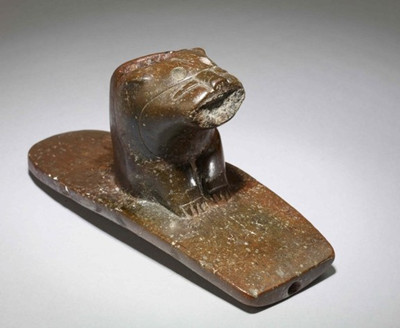When you talk about what is called the "peace pipe" at a treaty negotiation, that is more meaningful than to sign a document, so it's a way of sealing a deal not just legally but by giving a vow, and confirming that to the larger universe-so it's not just between humans, it's between humans and the greater powers that are there."
谈判时,“和平烟斗” 仪式比签署文件更有效。这种方式不仅意味着合法协定,还相当于向冥冥中的神灵起了誓。这就不仅签下了人与人,也签下了人与神之间的协议。
Even today in Native America smoking tobacco can still be a spiritual act-the smoke rises and mingles, bearing unified prayers skyward and, as it does so, it combines the hopes and wishes of the whole community.
直至今天,抽烟对印第安人来说也仍是神圣的。烟雾缓缓升起,逐渐消散, 带着众多的祈愿升向天空,将整个族群的希望连接在了一起。
For Europeans, though, who discovered smoking very late, in the sixteenth century, smoking tobacco quickly became less about religion than about relaxation: it was first of all about enjoyment, and then about money.
欧洲人晚至十六世纪才开始抽烟。对他们来说,抽烟没有什么宗教意义,更多的只是休闲方式。但很快,烟草便和金钱结合起来。
When the British colonised Virginia, the growing tobacco market in Europe rapidly became of prime economic importance-Bremen and Bristol, Glasgow and Dieppe all grew rich on American tobacco. As Europeans explored deeper into the continent in the eighteenth and nineteenth centuries, tobacco became an article of trade and currency in its own right. The European acquisition of tobacco, and European pipe-smoking, symbolise for many Native Americans the expropriation of their homeland.
英国在弗吉尼亚殖民之后,欧洲的烟草市场飞速发展,烟草很快成为经济支柱。不来梅与布里斯托尔,格拉斯哥与迪耶普的经济都因美洲的烟草而发达。18世纪至19世纪,随着欧洲人逐渐深入美洲大陆,烟草成了一种货物货币。在土著眼里,欧洲人收集烟草和使用烟斗的行为都是在侵略他们的家园。
From then on, in Europe and indeed in most of the world, smoking became an activity associated with pure pleasure, daily habit and considerable cool. For most of the twentieth century, film stars puffed away on screen, while their cinema audiences admired them through answering clouds of smoke.
自此,在欧洲和世界上大多数地方,抽烟成了一种单纯的享乐方式、日常习惯或是扮酷手段。大半个二十世纪,电影明星都在屏幕上抽烟,观众们则在影院里吞云吐雾。













